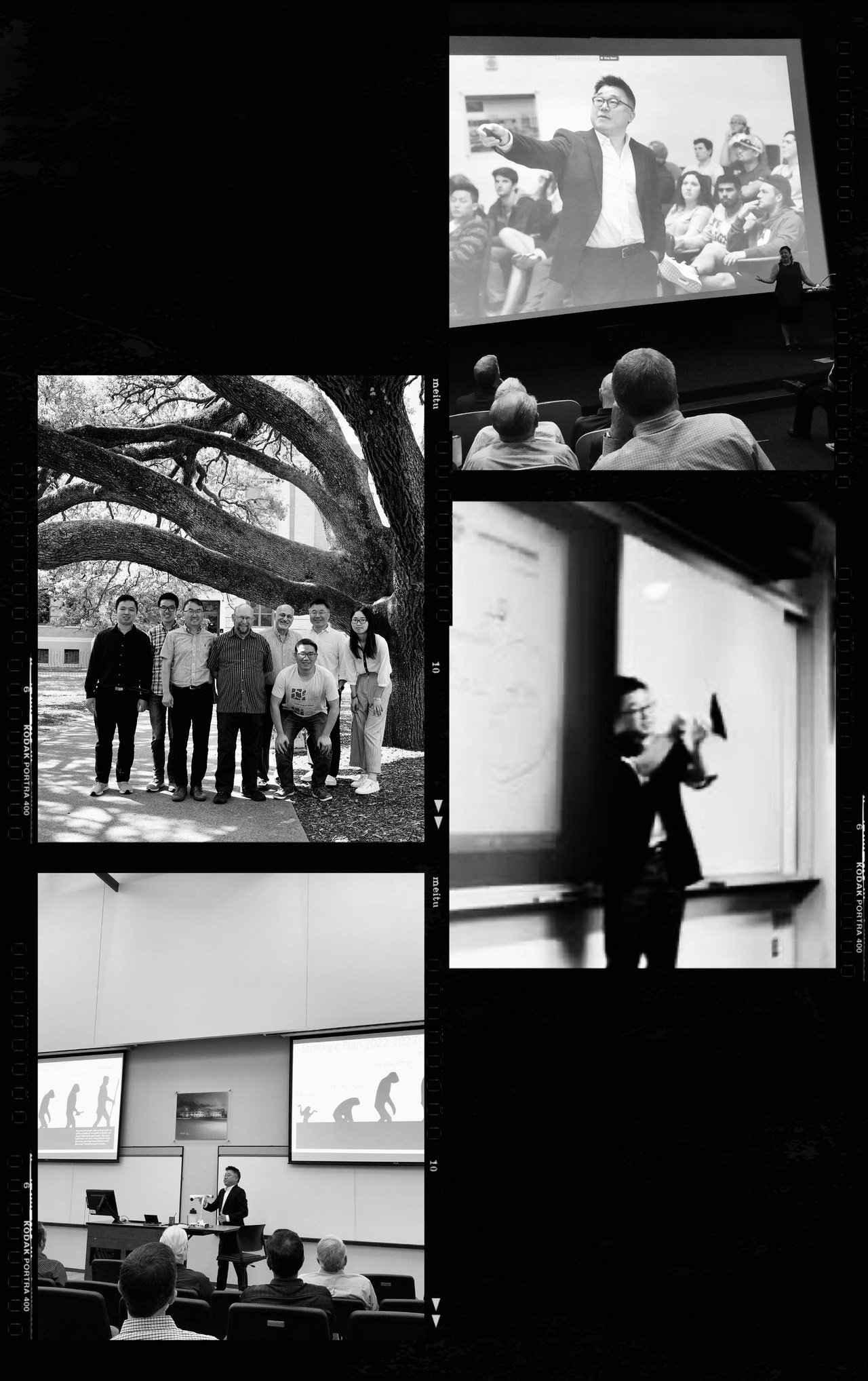Project
The era of new mixed mobility
A paradigm shift in intelligent transportation has occurred, transitioning from a reactive to a predictive approach, thanks to AI’s adaptive power. This shift has led to the proliferation of innovative ideas and their accessibility to the public for real-time decision-making. In the era of mixed modes of transportation, there is an urgent need to rectify and enhance the planning results by adding digital intelligence to the legacy transportation infrastructure planning and management practices. (KC Choi)
Active Research Projects
Develop Methodologies for Reducing Costs in Full Depth Reclamation (FDR) Construction
Co-Principal Investigator
TxDOT currently employs full-depth reclamation (FDR) for pavement rehabilitation. Historically, these projects have incorporated cement additives to enhance early strength, which is crucial for daily traffic access. However, some materials meet strength requirements without cement, and not all projects require daily traffic. With potential cement shortages, using only asphalt in FDR design offers advantages like lower costs, reduced delays, and increased construction productivity. This approach could reduce costs and expedite project delivery. Research is needed to assess FDR materials' strength and stiffness properties with and without cement additives, considering their impact on early traffic access, construction staging, and long-term performance.
Funding Agency
Texas Department of Transportation (TxDOT)
Project Funds
$679,485
Project Duration
08/01/2022–07/30/2026
Develop an Interactive State-Wide Production Rate Estimation Tool for Reliable Contract Time Determination
Co-Principal Investigator
This research aims to utilize TxDOT's historical data to create an interactive tool that generates color-coded heat maps, visualizing production rate ranges across Texas for major work items. This advanced tool will greatly assist TxDOT in achieving on-time project completion, improving accuracy in contract time determination, and enhancing contractor schedule evaluations and progress monitoring.
Funding Agency
Texas Department of Transportation (TxDOT)
Project Funds
$374,458
Project Duration
09/01/2023–02/28/2026
REU Site: Smart and Sustainable Construction
Senior Personnel
Undergraduate students, including underrepresented minorities and veterans, from resource-limited programs will engage in a 10-week summer research and training program. Faculty mentors will select research projects and provide preparatory workshops to ensure completion. Enrichment and professional development activities will complement the program, fostering confidence in research skills. An external evaluator will assess the program, and faculty mentors will maintain post-graduation contact for continuous improvement.
Funding Agency
National Science Foundation
Project Funds
$402,904
Project Duration
09/01/2023–08/31/2026
AI-Based Roadway Digital Twinning System for Flooding (AIR-FLOOD)
Principal Investigator
When floodwaters strike, information regarding real-time flood-induced roadway damage and respective evacuation routes is not available to communities and first responders. We research the development of a digital twinning platform that shows flood-induced roadway damages during a storm and predicts the best possible routes for accessing victims. We investigate whether AIR-FLOOD can help connect coastal communities, first responders, and local infrastructure practitioners with the necessary predictive information. AIR-FLOOD and its associated toolkits will save time and lives, maximize the likelihood of evacuation and rescue success, and improve Texans' social connectedness. It also helps local transportation agencies prioritize roadway rehab projects.
Funding Agency
National Oceanic and Atmospheric Administration (NOAA)
through the National Sea Grant College Program (Texas)
Project Funds
$300,000
Project Duration
02/01/2022-08/30/2024
IRES Track II: US-Korea Advanced Transportation Infrastructure Informatics Institutes
Principal Investigator
Three yearly Advanced Transportation Infrastructure Informatics Institutes are offered at KAIST in South Korea. This initiative focuses on developing a workforce equipped for the future, deeply versed in adaptive transportation solutions and emerging artificial intelligence methodologies. IRES fellows from various disciplines are engaged in small, transdisciplinary student research teams in an action learning format. These teams operate within global grand challenge research themes and are fully supported and directed by experienced program mentors. The program's structure is progressive and revolutionary, providing a robust basis for the fellows' thesis work and research publications.
Funding Agency
National Science Foundation
Project Funds
$224,614
Project Duration
07/01/2020 – 06/30/2024
Completed Projects
Contingency Factors to Account for Risk in Early Construction Cost Estimates for Transportation Infrastructure Projects (NCHRP 15-71): Co-PI, National Cooperative Highway Research Program (NCHRP), Transportation Research Board of the National Academies, $250,000, 07/01/2020 – 06/30/2022
Deep Reinforcement Learning-Based Project Prioritization: Co-PI, U.S. Department of Transportation through the Transportation Consortium of South-Central States, $90,000, 08/01/2020 – 02/01/2022
Texas DOT Time Impact Analysis Curriculum Development: Co-PI, Texas Department of Transportation (TxDOT), $160,000, 01/10/2020 – 08/31/2022
Selecting the Most Feasible Construction Phasing Plans for Urban Highway Rehabilitation Projects: Principal Investigator, U.S. Department of Transportation through the Transportation Consortium of South-Central States, $90,000, 08/15/2019 – 02/14/2021
Holistic Network-Level Assessment of Pavement Flood Damages: Co-PI, U.S. Department of Transportation through the Transportation Consortium of South-Central States, $75,000, 08/15/2019 – 02/14/2021
Perform Feasibility Study on Use of Innovative Tools and Techniques to Accelerate Pavement Construction: Co-PI, Texas Department of Transportation (TxDOT), $480,843, 09/01/2018 – 08/30/2021
Develop Capacity and Cost Benefits of Super 2 Corridors: Co-PI, Texas Department of Transportation (TxDOT), $299,846, 09/01/2018 – 08/30/2020
Systematic Approach for Estimating Construction Contract Time: A Guidebook (NCHRP 08-114): Co-PI, National Cooperative Highway Research Program (NCHRP), Transportation Research Board of the National Academies, $500,000, 09/01/2018 – 08/30/2020
Harnessing Artificial Intelligence towards Autonomous Mobility and Safety Impact Prediction of Critical Highway Projects: Principal Investigator, T3 of Texas A&M Triads for Transformation, $30,000, TAMU President’s Excellence seed grant program, Jan. 2020 – Jan. 2021 (internal grant).
Right-Sizing Transportation Investments-Methods for Planning and Programming (NCHRP 19-14): Co-PI, National Cooperative Highway Research Program (NCHRP), Transportation Research Board of the National Academies, $500,000, Jan. 2017 – Dec. 2019
Design-Build Assessment: Co-PI, Maricopa Association of Government (MAG): Task Order No. 15, $97,502, 06/01/2019 – 03/21/2020.
Autonomous SWAT Machine-Learning Computer Model for Construction Work Zones: Principal Investigator, Construction Industry Advisory Council, $12,500, 06/01/2016 – 05/30/2017 (Internal grant)
Scoping and Managing Critical Transportation Infrastructure Projects: Principal Investigator, University’s Action 2015: Education First Initiative of TAMU, $15,000, 06/01/2014 – 05/31/2015 (Teaching grant)
Decision-Support Framework for Quantifying the Most Economical Incentive/Disincentive Dollar Amounts for Critical Highway Pavement Rehabilitation Projects: Principal Investigator, U.S. Department of Transportation UTC Program: SWUTC, $56,625, 03/01/2012 – 08/31/2013
Guides on the Use of Social Media to Improve Participation in Public Involvement Processes: Co-PI, Texas Department of Transportation (TxDOT), $184,496, 08/29/2012 – 08/31/2013
Effective Project Scoping Practices to Improve On-Time and On-Budget Delivery of 16 Highway Projects (NCHRP 08-88): Co-PI, National Cooperative Highway Research Program (NCHRP), $250,000, Aug. 2012 – Aug. 2015
Determining the Effectiveness of the Design-Build Method on Water Infrastructure Rehabilitation Projects: Principal Investigator, District of Columbia Water Resource Research Institute, $53,000
Authentication in Mobile−Cloud Environments: Co-PI, UDC strategic initiative fund, $35,000, 05/2010 – 05/2011
Incentive-based Decision-Support Model for Transportation Infrastructure Renewal: Principal Investigator, UDC seed grant award, $7,500 plus a $17,500 in-kind match, 12/2009 – 05/2010
Innovative Contracting Methods Implementation Studies: Lead Graduate Research Engineer, California Department of Transportation, $225,000, 01/2008 – 06/2009
Extended Applications of Rehabilitation Construction Productivity Analysis Products (CA4PRS): Lead Graduate Research Engineer, Federal Highway Administration, $1,200,000, 06/2008 – 06/2010
Construction and Traffic Monitoring for I-15 Devore Reconstruction Project: Graduate Research Engineer, California Department of Transportation, $240,000, 06/2003 – 08/2004



